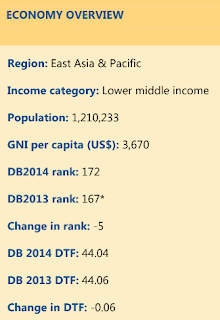This article summarizes key points from each report, with links to the originals. It is not a pretty picture.
Corruption Perceptions Index by Transparency International (TI)
 Timor-Leste scored 30 out of 100 this year, ranking 119th out of 177 countries. This is a little worse than last year, when our score of 33 earned us a rank of 113th out of 176. TI uses “a combination of surveys and assessments of corruption, collected by a variety of reputable institutions” to develop its index, although Timor-Leste’s score is calculated from only three sources. For more information and graphics, see Transparency International’s website.
Timor-Leste scored 30 out of 100 this year, ranking 119th out of 177 countries. This is a little worse than last year, when our score of 33 earned us a rank of 113th out of 176. TI uses “a combination of surveys and assessments of corruption, collected by a variety of reputable institutions” to develop its index, although Timor-Leste’s score is calculated from only three sources. For more information and graphics, see Transparency International’s website.Timor-Leste Scorecard from the Millennium Challenge Corporation (MCC)
The MCC is a U.S. government agency which enters into long-term “Compact” aid agreements with developing countries which meet certain criteria. Although Timor-Leste has not passed the “compact-eligible” hurdle for many years, we are nearing the end of a three-year MCC Threshold Program which is designed to raise our scores on the Child Health and Control of Corruption indicators. Although both of these scores improved slightly compared with a year ago, they are still far from passing, which would require that we do as well as at least half of the 26 other Low-Middle Income Countries. In the new scorecard, Timor-Leste passed the same indicators as last year. We improved (+) on nine indicators (most of which we already pass), dropped (-) on six, and were unchanged on three, as follows:- Passed
- Fiscal Policy
- Freedom of Information (+)
- Political Rights (+)
- Natural Resource Protection (+)
- Health Expenditure (-)
- Civil Liberties (+)
- Inflation (+) Failed
- Trade Policy (-)
- Regulatory Quality (+)
- Control of Corruption (+)
- Access to credit (-)
- Land rights and access
- Child health (+)
- Immunization Rates (+)
- Business Start-Up (-)
- Government Effectiveness (-)
- Rule of Law (-)
 Doing Business Report from the World Bank and International Finance Corporation (IFC)
Doing Business Report from the World Bank and International Finance Corporation (IFC)

Every year, Doing Business rates every country on how easy it is for businesses to operate, such as taxes, business registration, contract enforcement, bankruptcy procedures, construction permits, registering property, credit, protection for investors and other regulatory issues.
 Earlier this year, Doing Business published a special report comparing g7+ countries with data from DB 2013, as in the graph at right.
Earlier this year, Doing Business published a special report comparing g7+ countries with data from DB 2013, as in the graph at right.
 Article IV Consultation from the International Monetary Fund (IMF)
Article IV Consultation from the International Monetary Fund (IMF)

The IMF sends an assessment team to almost every country almost every year. About a week ago, they released their detailed report from an assessment conducted last June, which had been summarized in an October press release. In addition to describing IMF and Government views about macroeconomic and budget issues, the report includes a Debt Sustainability Analysis, Statistical summary, and updates. The IMF raised many points – La’o Hamutuk agrees with some but not with the ones in orange:
- As “one of the most natural resource dependent countries in the world with large developmental needs,” Timor-Leste needs to diversify its economy to generate jobs and reduce poverty, while preventing “rent-seeking behavior.” The “many uncertainties” about future oil revenues after Bayu-Undan production ends in 2024 make diversification crucial. [After the IMF report was written, Bayu-Undan projections were sharply downgraded; production will now end in 2020.]
- Growth in the productive, labor-intensive sectors of the economy, such as agriculture and manufacturing has been weak, with government spending leading to high imports and inflation. Medium-term growth should be led by the private sector, which must move away from government projects to agriculture, manufacturing and private services.
- Public spending should be limited to sustainable levels, targeted on projects with high socio-economic returns. The ‘Yellow Road’ scenario presented by the Ministry of Finance should be followed, to achieve “substantial moderation” in “high levels of government spending.” [When the IMF team visited in June, they were told the state would only spend $1.2 billion in 2014 and $1.3b/year in the medium term, but the 2014 budget proposed to Parliament in October will spend $1.5b, so many of the IMF’s projections are already inaccurate.]
- Petroleum Fund withdrawals should not exceed ESI.
- The currency should remain the US dollar for the medium term.
- Borrowing should be coordinated with Petroleum Fund balance, but the Fund should not be used as collateral for debt.
- Hidden debts, such as those which could be incurred by TimorGAP, should be avoided. Public-Private Partnerships (PPPs) and Special Economic Zones should be approached with caution.
- Management systems in the Government and Central Bank should be strengthened, as should statistical data collection and knowledge transfer to reduce dependence on foreign staff.
- The budget gap should be filled by concessional borrowing.
- Minimum wages should be lowered to be in line with ASEAN.







No comments:
Post a Comment